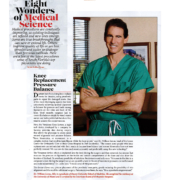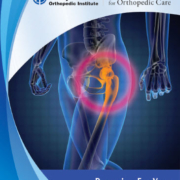Top Five “Need-to-Knows” about Hip Replacement Surgery
The latest statistics gathered by the Centers for Disease Control and Prevention (CDC) show that some 327,000 hip replacements are performed annually in the U.S. That number is predicted to increase to nearly 635,000 in the U.S. alone by the year 2030. Also, according to a 2018 report by Datamonitor, an international marketing firm, the U.S. accounts for approximately 50% of total hip replacement surgeries performed worldwide.
As head of the Leone Center for Orthopedic Care, I specialize in complex hip and knee issues. Here are the top five “need-to-knows” about hip replacement surgery:
1. Choose the right surgeon
Studies show that patients who are operated on by surgeons who specialize in performing hip replacements have fewer complications. Over the past 10 years, I have performed more than 5,000 joint replacement surgeries. According to Premier, the largest benchmarking comparative data service in the country, my complication and readmission rates are three times less than peer orthopedic surgeons throughout the country. As with all surgical procedures, it is imperative to choose a surgeon with a proven track record in this specialty. Get to know and have confidence in your doctor. Feeling comfortable with your surgeon will have a positive impact on your overall surgical experience.
2. Have realistic expectations
Prepare for your hip replacement surgery with a full understanding of what to expect before, during and after the procedure. Your primary focus should be to relieve pain and improve hip function by regaining strength and achieving a fuller range of motion. The ultimate goal is to be able to remain actively engaged in life and return to activities you are passionate about because the pain you had before surgery is gone. At The Leone Center for Orthopedic Care, we believe that a well informed patient not only has a better experience but also a better outcome. I personally spend considerable time with each patient, evaluating his or her symptoms and concerns. I then review with them my findings from their physical exams and X-rays and discuss thoroughly my diagnosis and how to solve their problems. If a hip replacement is recommended, I review what to expect before and after surgery. Our patients also attend an informative pre-operative class, where they meet with physical therapists, nurses and patient care managers. Many of these professionals are the same individuals patients will see after surgery. We’ve learned that if our patients are fully prepared, they feel empowered, are more confident and have a better hospital and overall experience. That is our goal. Over the years, I repeatedly have seen that patients who are more informed have less pain and anxiety, go home from the hospital sooner and get well more quickly.
3. Prepare for your surgery
At The Leone Center, we advise our patients to be proactive prior to hip replacement surgery with a healthy diet and exercise regimen. We tailor a specific program for each patient to ensure that he or she is in the best possible physical condition before surgery. I realize that some patients are not able to do certain particular hip or leg strengthening exercises before surgery because of their hip problems. We discourage any exercise or activity that causes pain. Still, there are many exercises and activities that even the most severly disabled patients can do in preparation. A patient who faithfully follows the pre-operative regimen greatly improves his or her chances for the most optimal outcome. Also, all of our patients are pre-operatively evaluated by their primary physicians to be sure they are good candidates for surgery.
4. Newer doesn’t necessarily mean better
As the need for artificial joints increases, it might seem like a good idea to be implanted with the newest prosthetics or with the newest technique or technology. However, unlike computers, artificial joints and the techniques used to implant them need to pass the test of time. Be sure to ask your doctor about which prosthetic implant, technique and technology will be used. Have a complete understanding of why your doctor chose a specified procedure for you, and what his or her success rate has been with that surgery. Unfortunately, in our competitive, financially driven world, some prostheses will be released for use without adequate, long-term follow-up testing. There are always new technologies or techniques but often time proves that they are no better than what we already have or they are worse. I think it is very important to have this discussion with your surgeon.
5. Understanding your artificial joint
Make sure you understand that artificial hip joints can wear out over time. However, with better and stronger materials being used to design prosthetics, if properly implanted, it is very reasonable that an artificial hip can last 20 years or more. Some artificial joints will not last nearly that long. Many times when they are failing, supportive bone or surrounding muscle and tendons can be destroyed. Therefore, it is important to have regular follow-up checkups with your surgeon. This may be as often as once a year or every two to three years depending on how your prosthesis is performing and your surgeon’s recommendations.
We thank you for your readership. If you would like a personal consultation, please contact our office at 954-489-4575 or by email at LeoneCenter@Holy-cross.com.











